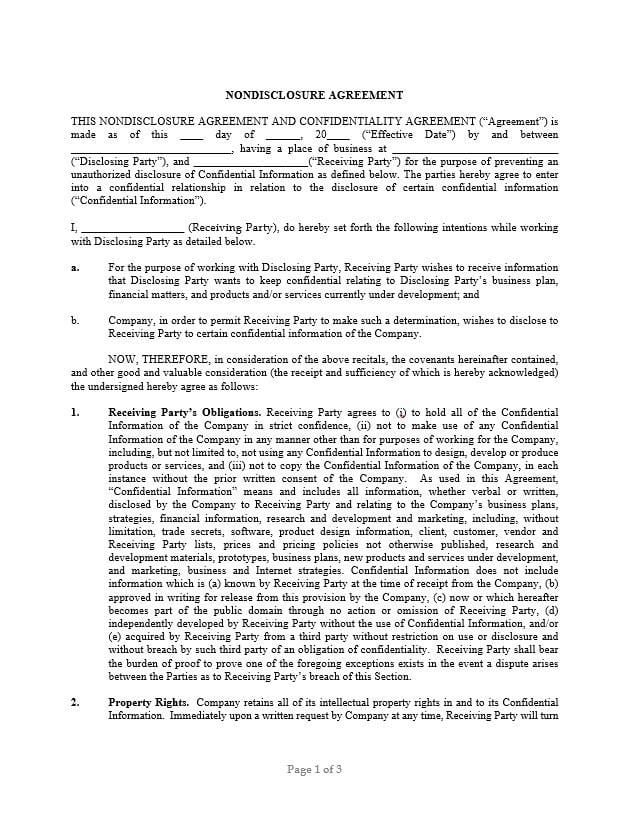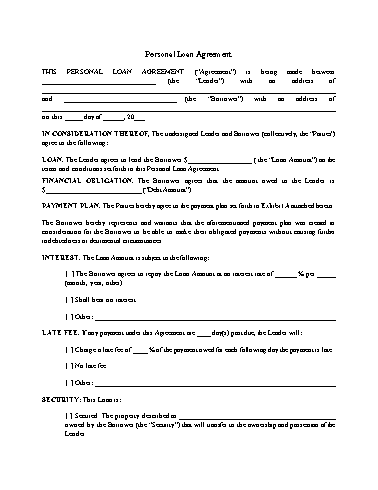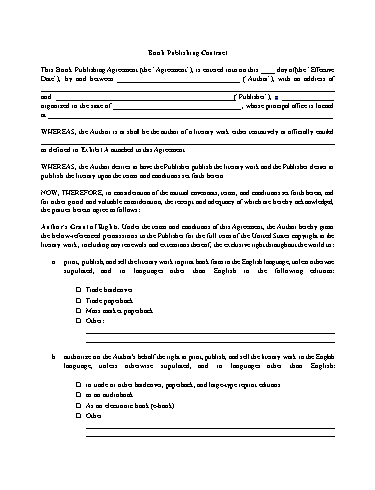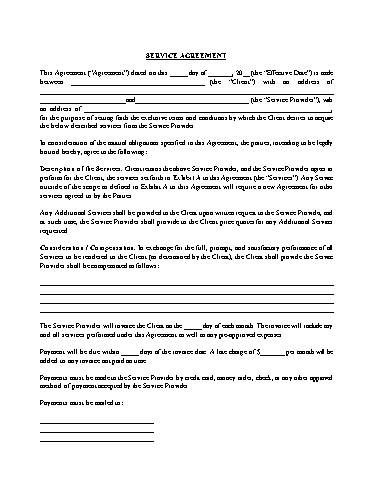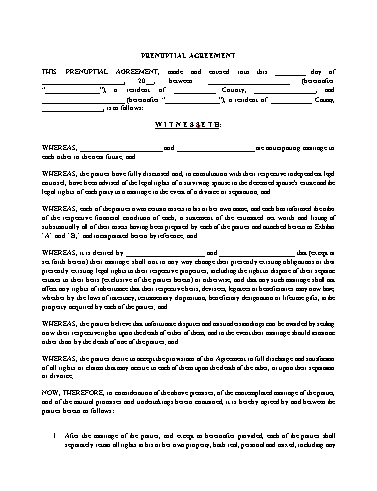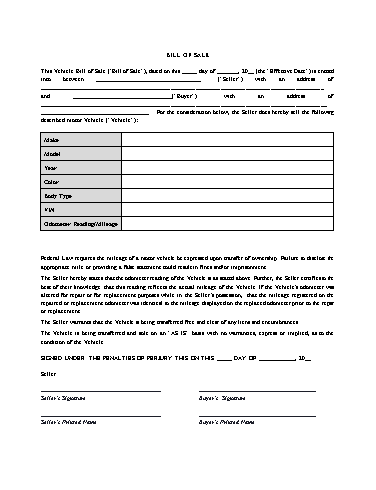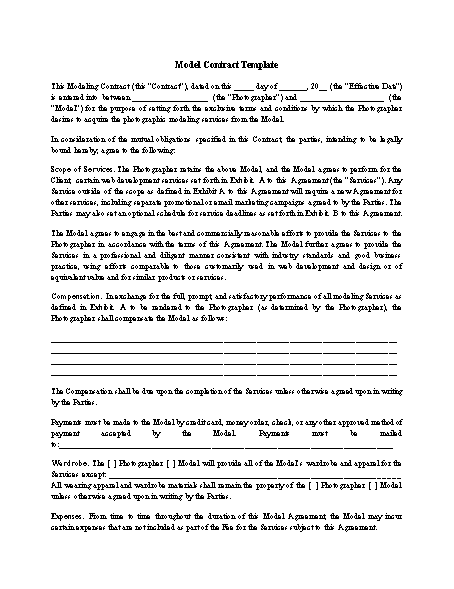Non-Disclosure Agreement Template
A non-disclosure agreement (NDA) is a standard business document. It is a formal agreement between two parties prohibiting the recipient from releasing certain confidential information to a third party or the general public. Confidential information includes any trade secrets, intellectual property, or any other information the company, or disclosing party, wishes to keep private. The purpose of a non-disclosure agreement is to protect the disclosing party’s confidential information from being revealed to a competitor or any other unauthorized use. If a recipient of an NDA breaches the agreement, they could be held liable for damages. A non-disclosure agreement is usually paired with a non-compete agreement or an employment agreement. A non-compete agreement is a legal contract that restricts an individual from working with or disclosing unauthorized information to a company’s direct competitor. The Basics of a Non-Disclosure Agreement
- It is an agreement of silence
- It creates a confidential relationship
- It protects a company’s sensitive, confidential information
- It prevents the recipient from revealing such information to a competitor
- It is a legally binding document
- It provides legal implications and liability if the receiving party breaches the agreement
Important Terms in a Non-Disclosure Agreement
- Disclosing Party – The party providing confidential information to the other
- Receiving Party – The recipient of confidential information from the other
- Unilateral NDA – Only the receiving party is agreeing to protect the disclosing party’s confidential information
- Mutual NDA (bilateral NDA) – Both parties are agreeing to protect each other’s confidential information
Non-disclosure agreements are also referred to as the following:
- Confidentiality Agreement (CA)
- Confidential Disclosure Agreement (CDA)
- Non-Disclosure and Confidentiality Agreement
- Proprietary Information Agreement (PIA)
- Secrecy Agreement (SA)
When Should you Use an NDA? NDA’s can be used in many different scenarios. NDA’s are typically used when a company provides confidential information (trade secret, proprietary information, intellectual property, etc.) that is not common knowledge to an employee or contractor. For an employee or contractor to meet their obligations and perform their job successfully, a company will need to provide certain information that is to remain confidential and protected. An NDA prevents the unauthorized disclosure of such confidential information. A non-disclosure agreement can either be unilateral or mutual. Unilateral is the most common NDA as it is used between employers and employees or between a company and a contractor. Mutual non-disclosures are when both parties are disclosing information to one another that each desire to keep confidential. Other uses of either a unilateral or mutual non-disclosure may include sharing ideas to a potential investor or business partner, or between a lender and a potential borrower. There are uses for a non-disclosure agreement outside of the employer/employee relationship. Here are a few instances when a non-disclosure agreement could be utilized:
- Independent Contractors: Most companies hire independent contractors for various projects. The company will have to provide confidential information to the contractor so that they can complete their job. The company will want to ensure that any sensitive information provided to the contractor is held in strict confidence and not offered to any competitor.
- Lenders/Borrowers: If a company is trying to obtain a loan from a lender, the lender will require access to a company’s business model and business plan before they will consider loaning money to a company. They may also require a company’s financial information to determine if they are willing to provide a loan. A non-disclosure agreement in this scenario prohibits the parties from releasing the information provided to an outside party. This is usually drafted as a mutual non-disclosure agreement.
- Inventors: If an individual or company has developed an invention that they wish to present to potential investors, a non-disclosure agreement is necessary. Without a non-disclosure in place, one of the investors could use your design or idea without any legal repercussions.
There are other scenarios where a non-disclosure agreement may be necessary, including consultants, real estate or business mergers and acquisitions, and many more. What are the Important Elements of a Non-Disclosure Agreement? A non-disclosure agreement may vary based on the circumstances or its intended use. Typically, a standard NDA will need to include the following:
- Parties to the agreement
- The effective date
- Information that is to remain confidential
- Information that is not confidential (i.e., pubic knowledge)
- Obligations of the receiving party
- Term of the NDA/time period
- Legal consequences in the event of a breach
Common Mistakes to Avoid Be careful not to disclose any confidential information before having the other party agree to and sign the non-disclosure agreement. The agreement should be presented to the receiving party before they are performing a project or job for a company to ensure they are legally bound to protect any sensitive information. The goal is to keep the non-disclosure agreement legally enforceable. Here are a few common mistakes to be aware of when drafting an NDA:
- Not explaining the receiving party’s obligations: this is the provision of the agreement that defines “confidential information” as it relates to the nature of the business or purpose of the contract.
- Forgetting to sign the agreement: both the disclosing party and the receiving party must sign the non-disclosure agreement for it to be legally binding and enforceable.
- Restricting what is “public knowledge: if the information is public knowledge, it cannot be expected to be protected information under a non-disclosure agreement.
- Term of the agreement: a non-disclosure should have a defined duration. This duration must be reasonable to be enforceable. Most NDA’s remain in effect from two to five years, but that should be specified in the NDA depending on the situation. Some Non-Disclosures may remain permanent, depending on the company and product.
- Not having a non-disclosure agreement: a non-disclosure agreement is an essential document for a company. It protects its proprietary information and provides legal recourse should the receiving party reveal any confidential information to a third party or competitor.
A previous employee or contractor could easily use the information obtained from your company and profit from it by starting their own similar company or by releasing information to a competitor. Not having a non-disclosure agreement in place can hurt your company in the long run. Imagine if Coca-Cola did not have a non-disclosure and confidentiality agreement in place. Coca Cola would not be as successful as they are today. It is a vital piece of their company to keep the ingredients a secret. This is true for other companies like Dr. Pepper and KFC. How to Make a Non-Compete Your Own Each non-disclosure agreement may be different based on what it is being used for. However, some Non-disclosures remain pretty standard across the board. For employees and independent contractors, the non-disclosure creates a confidential relationship between the two parties. The non-disclosure here usually remains consistent and does not need regular updating. If there is a particular position that may require a little more protection than other employees or contractors, that should be added with specificity. Conversely, if the NDA is mutual (lender/borrower), the structure and terms of the agreement will need to be modified to match the terms agreed upon by the parties. Drafters of non-disclosure agreements should not rely on oral agreements. Oral agreements are rarely enforceable. So, when it doubt, write it out! How do I get it signed? Electronic signatures are one of the most efficient ways to have an agreement signed. This is especially true with non-disclosure agreements. This is because the project, job, or event may be time-sensitive. E-signatures speed up the process so you can move along with the venture without having to waste time waiting for a party to come in and sign an agreement. E-signatures are legally binding. You can use ApproveMe.com to boost your company’s productivity and obtain the contracts you need signed expeditiously. ApproveMe also provides an NDA template and pdf that you can use as a go-by while drafting your own. It will modernize and transform the way you do business and get you focused on your next task. Resources for you and your Booming Business While your new business is blossoming, we wanted to link you up with some vital resources to point you in the right direction. Communication is key. That also rings true in the business world. Here are a few sources that can help promote effective communication between your company and its employees, representatives, contractors, and much more:
Your Signing experience is worth celebrating!
ApproveMe is easy document signing for busy people. Built on the belief that every new agreement with a customer or client should be celebrated.
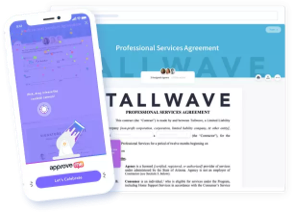
NONDISCLOSURE AGREEMENT
THIS NONDISCLOSURE AGREEMENT AND CONFIDENTIALITY AGREEMENT (“Agreement”) is made as of this ____ day of ______, 20____ (“Effective Date”) by and between ____________________________, having a place of business at _____________________________ (“Disclosing Party”), and ____________________(“Receiving Party”) for the purpose of preventing an unauthorized disclosure of Confidential Information as defined below. The parties hereby agree to enter into a confidential relationship in relation to the disclosure of certain confidential information (“Confidential Information”). I, __________________ (Receiving Party), do hereby set forth the following intentions while working with Disclosing Party as detailed below. a. For the purpose of working with Disclosing Party, Receiving Party wishes to receive information that Disclosing Party wants to keep confidential relating to Disclosing Party’s business plan, financial matters, and products and/or services currently under development; and b. Company, in order to permit Receiving Party to make such a determination, wishes to disclose to Receiving Party to certain confidential information of the Company. NOW, THEREFORE, in consideration of the above recitals, the covenants hereinafter contained, and other good and valuable consideration (the receipt and sufficiency of which is hereby acknowledged) the undersigned hereby agree as follows: 1. Receiving Party’s Obligations. Receiving Party agrees to (i) to hold all of the Confidential Information of the Company in strict confidence, (ii) not to make use of any Confidential Information of the Company in any manner other than for purposes of working for the Company, including, but not limited to, not using any Confidential Information to design, develop or produce products or services, and (iii) not to copy the Confidential Information of the Company, in each instance without the prior written consent of the Company. As used in this Agreement, “Confidential Information” means and includes all information, whether verbal or written, disclosed by the Company to Receiving Party and relating to the Company’s business plans, strategies, financial information, research and development and marketing, including, without limitation, trade secrets, software, product design information, client, customer, vendor and Receiving Party lists, prices and pricing policies not otherwise published, research and development materials, prototypes, business plans, new products and services under development, and marketing, business and Internet strategies. Confidential Information does not include information which is (a) known by Receiving Party at the time of receipt from the Company, (b) approved in writing for release from this provision by the Company, (c) now or which hereafter becomes part of the public domain through no action or omission of Receiving Party, (d) independently developed by Receiving Party without the use of Confidential Information, and/or (e) acquired by Receiving Party from a third party without restriction on use or disclosure and without breach by such third party of an obligation of confidentiality. Receiving Party shall bear the burden of proof to prove one of the foregoing exceptions exists in the event a dispute arises between the Parties as to Receiving Party’s breach of this Section. 2. Property Rights. Company retains all of its intellectual property rights in and to its Confidential Information. Immediately upon a written request by Company at any time, Receiving Party will turn over to Company all Confidential Information of Company and all documents or media containing any Confidential Information of Company and any and all copies or extracts thereof. 3. Actions Not Required. Receiving Party understands that nothing herein (a) requires the disclosure of any Confidential Information of Company, which shall be disclosed, if at all, solely at the option of Company or (b) requires Company or Receiving Party to proceed with any proposed transaction or relationship in connection with which Confidential Information of Company may be disclosed. 4. No License Granted. Neither the execution and delivery of this Agreement nor the furnishing of any Confidential Information of Company by Company shall be construed as granting to Receiving Party either expressly, by implication, estoppel or otherwise, any license under any invention, patent, trademark, or copyright now or hereafter owned or controlled by Company. 5. No Adequate Remedy at Law. Receiving Party acknowledges and agrees that due to the unique nature of the Confidential Information of Company, there can be no adequate remedy at law for any breach of its obligations hereunder, that any such breach may allow Receiving Party or third parties to unfairly compete with Company resulting in irreparable harm to Company, and, therefore, that upon any such breach or any threat thereof, Company shall be entitled to (a) specific performance and other injunctive relief without the necessity of posting a bond, in addition to whatever remedies it might have at law, and (b) be indemnified by Receiving Party from any loss or harm, including, without limitation, attorney’s fees, in connection with any breach or enforcement of Receiving Party’s obligations hereunder or the unauthorized use or release of any such Confidential Information of Company. Receiving Party shall notify Company in writing immediately upon the occurrence of any such unauthorized release or other breach of which it is aware. Receiving Party shall notify Company in writing immediately upon the occurrence of any such unauthorized release or other breach of which it is aware. Violation of this agreement by the Receiving Party will entitle the Company to an injunction to prevent such competition or disclosure, and will entitle the Company to other legal remedies, including attorney’s fees and costs. 6. Governing Law. This Agreement shall be governed in all respects by the laws of the State of ___________________ without regard to the conflict of law provisions of such state. This Agreement shall be binding upon the successors and assigns of the respective parties. 7. Disclosure Under Court Order. Receiving Party may make disclosures required by court order if Receiving Party (a) uses reasonable efforts to limit disclosure and to obtain confidential treatment or a protective order and (b) promptly provides notice to Company of and allows Company to participate in the proceeding. 8. Return or Destruction of Confidential Information. At any time during or after the term of this Agreement, at the Disclosing Party’s written request, the Receiving Party and its Representatives shall promptly return to the Disclosing Party all copies, whether in written, electronic, or other form or media, of the Disclosing Party’s Confidential Information, or destroy all such copies and certify in writing to the Disclosing Party that such Confidential Information has been destroyed. In addition, the Receiving Party shall also destroy all copies of any Notes created by the Receiving Party or its Representatives and certify in writing to the Disclosing Party that such copies have been destroyed. 9. Notice. All notices or requests required or contemplated by this Agreement shall be in writing and (a) if from Company to Receiving Party, shall be hand-delivered or mailed to ____________, __________________________________________, or such other address as Receiving Party shall specify in written notice to Company, or (b) if from Receiving Party to Company, shall be hand-delivered or mailed to ________________________________________________________, or such other address as Company shall specify in written notice to Receiving Party. Requests or notices given by personal delivery shall be deemed given and received at the time of delivery and requests or notices given by mail shall be deemed given and received the earlier of three days from the date of mailing or upon receipt. 10. General Provisions. In the event that any of the provisions of this Agreement shall be held by a court or other tribunal of competent jurisdiction to be illegal, invalid or unenforceable, such provisions shall be limited or eliminated to the minimum extent necessary so that this Agreement shall otherwise remain in full force and effect. This Agreement supersedes all prior discussions and writings and constitutes the entire agreement between the parties with respect to the subject matter hereof. This Agreement may not be modified or amended except by an instrument in writing signed by the parties hereto. Accordingly, no course of conduct shall constitute an amendment or modification of this Agreement. No waiver of this Agreement will be binding upon either party unless made in writing and signed by a duly authorized representative of each party and no failure or delay in enforcing any right will be deemed a waiver. All waivers shall be strictly construed. 11. No Warranty. COMPANY EXPRESSLY DISCLAIMS ANY EXPRESS OR IMPLIED WARRANTIES RELATING TO THE CONFIDENTIAL INFORMATION INCLUDING, WITHOUT LIMITATION, IMPLIED WARRANTIES OF MERCHANTABILITY, FITNESS FOR A PARTICULAR PURPOSE OR NONINFRINGEMENT, OR THAT ANY PARTICULAR INFORMATION IS IN FACT CONFIDENTIAL. 12. Entire Agreement. This Agreement constitutes the sole and entire agreement of the Parties regarding the subject matter contained herein, and supersedes all prior and contemporaneous understandings, agreements, representations, and warranties, both written and oral, regarding such subject matter. This Agreement may only be amended, modified, or supplemented by an agreement in writing signed by each Party hereto. 13. Severability. If any term or provision of this Agreement is invalid, illegal, or unenforceable in any jurisdiction, such invalidity, illegality, or unenforceability shall not affect any other term or provision of this Agreement or invalidate or render unenforceable such term or provision in any other jurisdiction. 14. Counterparts. This Agreement may be executed in counterparts, each of which shall be deemed an original, but all of which together shall be deemed to be one and the same agreement. A signed copy of this Agreement delivered by facsimile. email, or other means of electronic transmission shall be deemed to have the same legal effect as delivery of an original signed copy of this Agreement. 15. Electronic Signatures. This Agreement and related documents entered into in connection with this Agreement are signed when a party’s signature is delivered electronically, and these signatures must be treated in all respects as having the same force and effect as original signatures. 16. Assignment. Neither Party may assign any of its rights of its obligations hereunder without the prior written consent of the other Party. Any purported assignment in violation of this Section shall be null and void. No assignment shall relieve the assigning Party of any of its obligations hereunder. This Agreement is for the sole benefit of the parties hereto and their respective successors and permitted assigns and nothing herein, express or implied, is intended to or shall confer on any other person or entity any legal or equitable right, benefit, or remedy of any nature whatsoever under or by reason of this Agreement. 17. Waivers. No waiver by any Party of any of the provisions hereof shall be effective unless explicitly set out in writing and signed by the Party so waiving. No waiver by any Party shall operate or be construed as a waiver in respect of any failure, breach, or default not expressly identified by such written waiver, whether of a similar or different character, and whether occurring before or after that waiver. No failure to exercise, or delay in exercising, any right, remedy, power, or privilege arising from this Agreement shall operate or be construed as a waiver thereof; nor shall any single or partial exercise of any right, remedy, power, or privilege hereunder preclude any other or further exercise thereof or the exercise of any other right, remedy, power, or privilege. IN WITNESS WHEREOF, the parties hereto have duly executed and have caused this Agreement duly to be executed and delivered as of the Effective Date. Agreed To: “Disclosing Party” ___________________ ___________________ ___________________ _____________________________________ Authorized Signature Agreed To: “Receiving Party” ___________________ ___________________ ___________________ _____________________________________ Authorized Signature
Frequently Asked Questions
What is a non disclosure agreement template?
The purpose of a non disclosure agreement is to set guidelines for how employees can share confidential information with third parties. It also helps protect companies from potential lawsuits if an employee does not follow the guidelines outlined in the contract.
How do I write a non-disclosure agreement?
Are NDAs enforceable?
An NDA is a contract that is usually signed between two parties who want to keep their confidential information private. It can be used for many purposes such as protecting trade secrets, intellectual property, or other sensitive data.
In most jurisdictions, an NDA is enforceable if it meets certain requirements such as the following:
- The terms of the agreement must be clear and unambiguous;
- The agreement must not violate public policy;
- There must be consideration in exchange for entering into the agreement;
- There must be no duress involved in signing the contract
What is a non disclosure agreement?
What does non disclosure agreement mean?
These agreements can be used for many purposes, such as protecting trade secrets, securing intellectual property rights, and granting access to confidential information that might be valuable to one side but not the other.
What happens if you violate a non disclosure agreement?
If you violate a non-disclosure agreement, you run the risk of getting sued for both damages and punitive damages.
How do non disclosure agreements work?
The agreement is legally binding and requires each party to keep the terms confidential. This is a standard document that can be customized for any type of business or industry.
There are numerous benefits to using non disclosure agreements. They help protect intellectual property, reduce liability exposure, and prevent future disputes.
What are the three types of non disclosure?
1) Non-disclosure Agreement: This is a contract that prevents the person who signs it from sharing any information about the company or project with anyone else
2) Nondisclosure Agreement with an Option to Disclose: This is a contract that gives the signer the option to disclose some information at a later date. It also prevents them from disclosing any other information
3) Nondisclosure Agreement without an Option to Disclose: This is a contract that prevents both parties from disclosing any information.
Can anyone get a free non disclosure agreement?
How long is the NDA valid for?
What's a non disclosure agreement?
What does a non disclosure agreement protect?
Non disclosure agreements are also known as NDAs and they are often used between parties in order to avoid disputes, lawsuits, or potential lawsuits with competitors over trade secrets or similar issues.
Why did ApproveMe.com create this non disclosure agreement sample?
We want you to protect your business and yourself with high quality, ready-to-sign contract and agreement templates!
Can I modify this non disclosure agreement template word ?
Send Contracts in Minutes
Unlock the power of WP E-Signature on your website using your branding today!
Get Started Now

